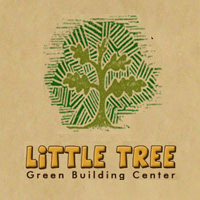
Little Tree Bali - Green Building Centre
by email
by phone
Customer Service
+62 (0) 81139605497
If you have a special request please feel free to contact our staff directly.
in our store
Now open from Monday to Saturday:
9:00 - 18:00
Stephen Palmer: A Little Tree Advisor
Steve Palmer has been at the forefront of the environmental fight in Bali for more than a decade. In this interview, he talks about how green buildings can contribute to addressing the island's environmental problems.
Stephen Palmer was born in the Western Suburbs of Sydney. At the age of 14 he was turned on to surfing, spending his free time on the beaches of Sydney. When he turned 16, he acquired an old unregistered van which he repaired and registered over the period of a year in readiness for receiving his driving license. This was his ticket out of the city every Friday afternoon for the weekend surfing safaris up north in the country.
Stephen went on to study plastics engineering for a few years until his first trip to Bali as a surfer in 1974, during what he calls Bali’s “Morning of the Earth era.” That was it -- he’s been here ever since. Over the years, he has traveled extensively throughout the islands of Sumatra, Java, Kalimantan, Sulawesi, Sumbawa, Lombok, Rote and Timor.
He is presently a business partner at Surfer Girl International, which licenses the brand to a surf shop which opened in Kuta in 1998. Steve also serves as advisor and green spokesperson for Little Tree, a one-stop shop for a greener lifestyle, which helps Bali’s residents to build and renovate in a more environmentally-friendly way.
How did you first become interested in environmental issues?
I guess it was the 1972 edition of the Whole Earth Catalog which opened my eyes to how to treat the earth, and what its inhabitants were fully capable of.
What’s the concept behind Little Tree?
To create an alternative green products and building materials and information center to support positive ecological change. It is also a gathering and networking place where the concerns of humanity and social and environmental responsibility play an integral part in everything they do.
There are meeting rooms and a seminar space that is available for any worthy social cause at no charge. There was also a desire to establish a high-quality raw food, vegan , and vegetarian café which they have successfully done in collaboration with Sari Organic.
Who owns the company?
Some very environmentally-aware Indonesians own Little Tree. It is a for profit company with an emphasis on heart and care that will hopefully serve as an inspiration and successful model for other businesses.
Why is it important to use eco-friendly products in building?
It’s crucial if there is to be a world in the future. From the perspective of human health it’s also important not using toxic materials.
The old world headspace on development and consumption is sending us to the point of no return as the world then proceeds to shut down life support systems for fragile life form like animals & humans.
At the moment we are eliminating species at a horrifying rate, and once we reach that tipping point we will be added to that list. Making that extra dollar on that destructive product--that is what is taking us to the tipping point. It does not matter it you believe this or not. Toxic waste made by the symbiosis of the cocktail of chemicals that are released in our earth, rivers, and oceans are killing species daily and these chemicals do not care what you believe.
How are you certain that Little Tree products and materials perform in an eco-friendly manner?
That question is a never-ending story of layers upon layers of finer detail.
What is important is that Little Tree starts with the best green-based products that they can source, and preferably at a price that is affordable to our users. These products are selected by several knowledgeable educated advisors at Little Tree who are constantly searching for the next level of improvement in the types of products that Little Tree sells.
All products are in a state of constant improvement -- no product has reached it maximum potential.
Are green products more expensive than products bad for the environment?
It’s true that most green products are more expensive, as the more healthy products are normally more expensive to produce due to the materials used and the safer manufacturing methods compared to normal products.
Bad products are not only harmful in themselves, that are normally much more harmful in the waste they produce during their manufacturing. Most products on the market would already be green if today’s businesses did not choose cheaper and more harmful alternatives to make that extra buck and compete with each other to manufacture the most toxic cheapest junk. To be honest, most producers don’t care what they sell. It could be toxic mud for all they care.
What are your most popular products?
Actually, the vision and the invitation to try another way of doing things is my favorite product.
The most popular products are community forest bamboos and timber, zero or very low toxic emission paints, led and compact lighting, laminated bamboo flooring and other items, clay wall finishes, low VOC timber coatings, dustless re-sanding of timber flooring and recoating with very low VOC coatings and oils, biodegradable soaps, detergents and of course the Sari Organic Café with its delicious healthy meals and relaxed vibes!
What do you consider Bali’s most urgent environmental problem?
There are two, both related to behavior and values. The biggest problem without doubt is apathy. Many feel there is no point in trying because the people see that many of those that can really make a change do not care enough and are more centered on themselves and their never ending material insecurities.
The other is corruption where environmentally dangerous /damaging issues can be hidden and pass under the radar through a discrete and sometimes not so discrete agreement , this is no secret , it is headline news in the local press several times a week. If these two were dealt with the real physical issues would be able to be worked on at a relatively fast rate .
Just show the people you really are serious about making a positive environmental change for the Island and they will respond.
Do you think Indonesia’s vast forests can be saved?
Yes, but only if consumers stop supporting the raping and plundering the nation’s timber by their buying processes. Illegally felled timber makes up about 85% of what is sold in the market.
The question is: will you pay 30% to 50% more for community and controlled plantation timber to save the rainforests? If the answer is no and you allow your pocketbook to make the decision for you, then YES Indonesia’s forests are doomed.
You cannot just go out there and buy the cheapest timber and even for one minute hope to save the forests, because that extra is what it costs for timber to be certified by a trustworthy international body and truly controlled and accounted for all the way down the line.
Consumers have to demand to see the proper certification. Will you ?
What are the most important actions people can take to conserve Bali’s environment?
The most important action is getting organized.
We must first acknowledge that we are eating up our resources at a prodigious rate, then we must slow down our consumption of stuff as much as we can on a personal level as a starting point, get all the information on our situation regarding the depletion of resources, and the pollution created in making stuff , then start a people’s movement along with government, business and industry to reverse and manage our consumption and waste.
The Government must become involved as they are actually people too--we tend to forget this and think of “Government” as a machine: set a goal and go for it, make it rewarding.
Even small but steady steps are important, as long as they are constantly happening and we keep moving forward, even if it’s only changing the type of light bulb we use, as long as after we do that we always look at what’s next . Start working as one unified front.
Without coming together we have no hope. In collective large numbers, the NGOs and everyone else who cares need to talk to and work with the Government.

